Please note that the financials in this complete free business plan are completely fictitious and may not match the text of the business plan below. This free business plan demonstration purposes only. If you are interested in purchasing the completed editable MS Word and Excel documents for this business plan, please click the button below! Also, the text of the business plan is formatted with a fully automated table of contents.
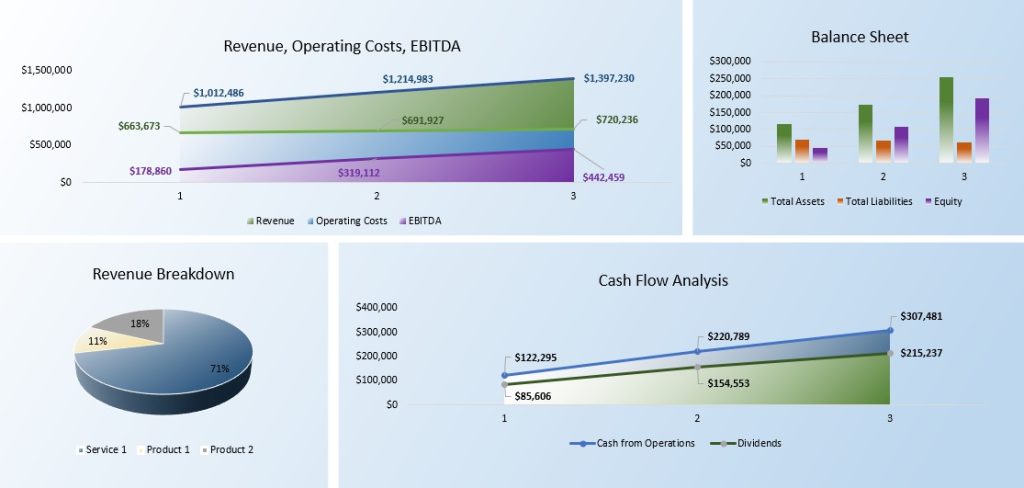
1.0 Executive Summary
The purpose of this business plan is to raise $2,000,000 for the acquisition of a large scale dinner train showcasing the expected financials and operations over the next three years. Dinner Train, Inc. (“the Company”) is a New York based corporation that will provide a mobile dining experience to customers in its targeted market. The Company was founded by John Doe.
1.1 Operations
As stated above, the business intends to acquire a dinner train (3 cars) that will travel a local train route while concurrently serving dinner to its customers. Two of the cars will be used for serving food while the third car will be used for locomotive purposes and food preparation purposes. At this time, Mr. Doe is sourcing the routes that will be used in conjunction with the dinner train’s services. The third section of the business plan will further document the services offered by the business.
1.2 The Financing
Mr. Doe is seeking to raise $2,000,000 from an investor. The terms, dividend payouts, and aspects of the deal are to be determined at negotiation. This business plan assumes that an investor will receive 50% of the Company’s stock, a regular stream of dividends, and a seat on the board of directors. The financing will be used for the following: • Financing to acquire the Dinner Train equipment and location. • Financing for the first six months of operation. • Capital to purchase a company vehicle. Mr. Doe will contribute $10,000 to the venture.
1.3 Mission Statement
Mr. Doe’s mission is to develop Dinner Train, Inc. into an exciting experience for customers within the target market.
1.4 Management Team
The Company was founded by John Doe. Mr. Doe has more than 10 years of experience in the entertainment industry. Through his expertise, he will be able to bring the operations of the business to profitability within its first year of operations.
1.5 Sales Forecasts
Mr. Doe expects a strong rate of growth at the start of operations. Below are the expected financials over the next three years.
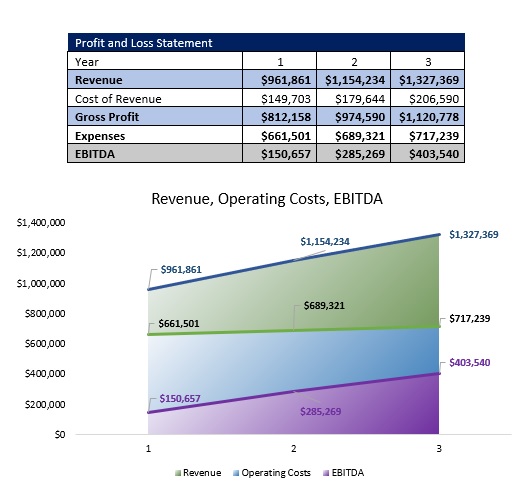
1.6 Expansion Plan
The Founder expects that the business will aggressively expand during the first three years of operation. The business will continually reinvest into its marketing infrastructure.
2.0 Company and Financing Summary
2.1 Registered Name and Corporate Structure
Dinner Train, Inc. The Company is registered as a corporation in the State of New York.
2.2 Required Funds
At this time, the Dinner Train requires $2,000,000 of investor funds. Below is a breakdown of how these funds will be used:
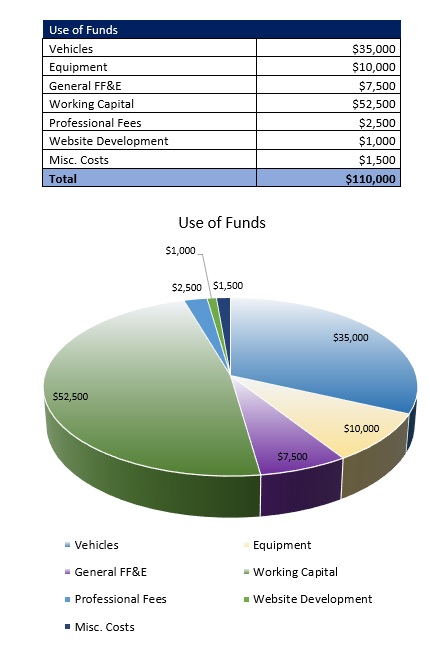
2.3 Investor Equity
John Doe intends to sell 50% of the Dinner Train in exchange for the capital.
2.4 Management Equity
John Doe will retain 50% of the business once the capital is raised.
2.5 Exit Strategy
If the business is very successful, Mr. Doe may seek to sell the business to a third party for a significant earnings multiple. Most likely, the Company will hire a qualified business broker to sell the business on behalf of Dinner Train, Inc.
3.0 Operations
Below is a description of products/services offered by the Dinner Train.
3.1 Dinner Train Services
As stated earlier, the Dinner Train will operate a three car train that will be designed to provide sales of prepared meals to customers that want to have a mobile/visual dining experience. The business, from the onset of operations, will have a staff of seven people that will serve the approximately 40 patrons that will engage the Company’s services on a nightly basis. The pricing for the Company’s dinner train services can be found in the fifth section of the business plan. Frequently, the business will work with event planners that will rent out the Company’s train and services for a specific event on a nightly basis. At this time, Dinner Train, Inc. is also obtaining all of the necessary licensure in order to operate this business.
4.0 Strategic and Market Analysis
4.1 Economic Outlook
Management is developing a very complex pricing method to ensure that the Company can continue to provide its dinner train services at profit despite possible drawbacks in the overall economic market. Currently, the economic market condition in the United States is sluggish. This slowdown in the economy has also greatly impacted real estate sales, which has halted to historical lows. Many economists expect that this sluggish will continue for a significant period of time, at which point the economy will begin a prolonged recovery period.
4.2 Industry Analysis
The specialized entertainment (which includes dinner trains) industry generates approximately $1.5 billion dollars a year among 2,700 companies that operate dinner trains and other unique entertainment facilities. These revenue numbers does not include amusement parks, casinos, or resorts that provide these services as a value added benefit to patrons. The industry employs more than 30,000 people and provides aggregate annual payrolls of $350 million dollars. As stated earlier, the arcade industry is mature. The expected continued growth of these businesses is expected to mirror the general population growth plus the rate of inflation.
4.3 Customer Profile
Management anticipates that the average patron of the Dinner Train will be a middle to upper middle class man, woman, or family living within the Company’s target market. Common traits among these demographics include: • Annual household income of $75,000+ • Will spend $200 per Dinner Train excursion. • Lives within 50 miles of the Dinner Train. • Has an interest in unique dining.
4.4 Competitive Analysis
This is one of the sections of the business plan that you must write completely on your own. The key to writing a strong competitive analysis is that you do your research on the local competition. Find out who your competitors are by searching online directories and searching in your local Yellow Pages. If there are a number of competitors in the same industry (meaning that it is not feasible to describe each one) then showcase the number of businesses that compete with you, and why your business will provide customers with service/products that are of better quality or less expensive than your competition.
5.0 Marketing Plan
Dinner Train, Inc. intends to maintain an extensive marketing campaign that will ensure maximum visibility for the acquired units in its targeted market. Below is an overview of the marketing strategies and objectives of the Company.
5.1 Marketing Objectives
- Establish relationships with event planners within the Company’s targeted markets.
- Implement a local campaign with the Company’s targeted market via the use of flyers, local newspaper advertisements, and word of mouth.
5.2 Marketing Strategies
Mr. Doe intends on using a number of marketing strategies that will allow the Dinner Train to easily target individuals and event planners within the target market. These strategies include traditional print advertisements and ads placed on search engines on the Internet. Below is a description of how the business intends to market its products to retail locations. The Dinner Train will also use an internet based strategy. This is very important as many people seeking local services, such as dinner trains, now the Internet to conduct their preliminary searches. Mr. Doe will register the Company with online portals so that potential customers can easily reach the business. The Company will also develop its own online website showcasing the dinner train, its menu, costs, and contact information. The Company will maintain a sizable amount of print and traditional advertising methods within local markets to promote the dinner train services that the Company is selling.
5.3 Pricing
In this section, describe the pricing of your services and products. You should provide as much information as possible about your pricing as possible in this section. However, if you have hundreds of items, condense your product list categorically. This section of the business plan should not span more than 1 page.
6.0 Organizational Plan and Personnel Summary
6.1 Corporate Organization

6.2 Organizational Budget

7.0 Financial Plan
7.1 Underlying Assumptions
- Dinner Train will have an annual revenue growth rate of 6% per year.
- The Owner will acquire $2,000,000 of investor funds to develop the business.
- The Company will not seek debt financing in the first three years of operations.
7.2 Sensitivity Analysis
The Company’s revenues are somewhat sensitive to the overall conditions of the economy. During times of economic recession, the Company may have a decrease in its top line revenues as people will demand fewer higher priced dinner train and food services.
7.3 Source of Funds

7.4 General Assumptions

7.5 Profit and Loss Statement
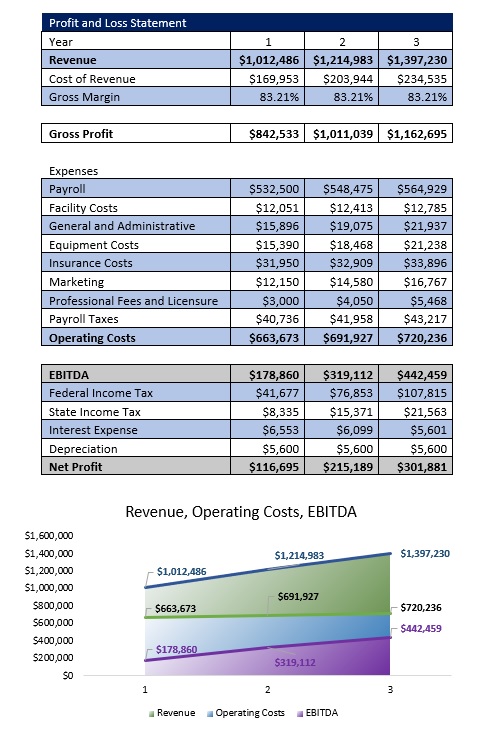
7.6 Cash Flow Analysis
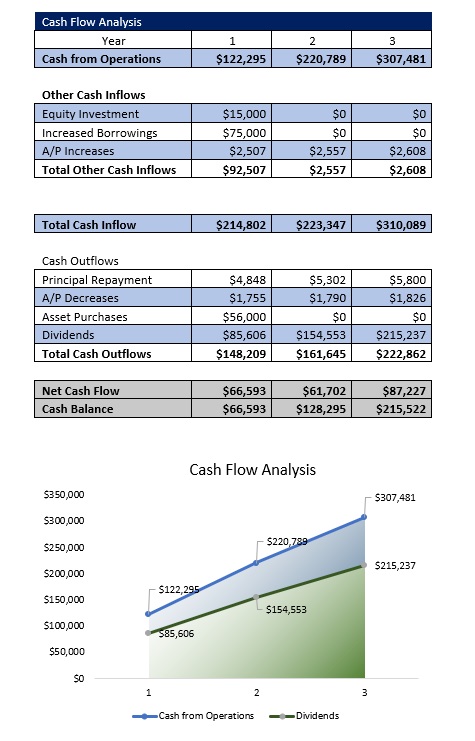
7.7 Balance Sheet

7.8 Breakeven Analysis
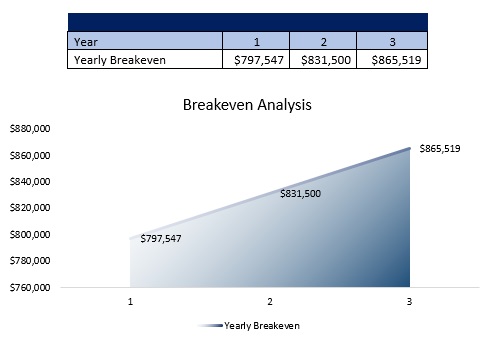
7.9 Business Ratios

